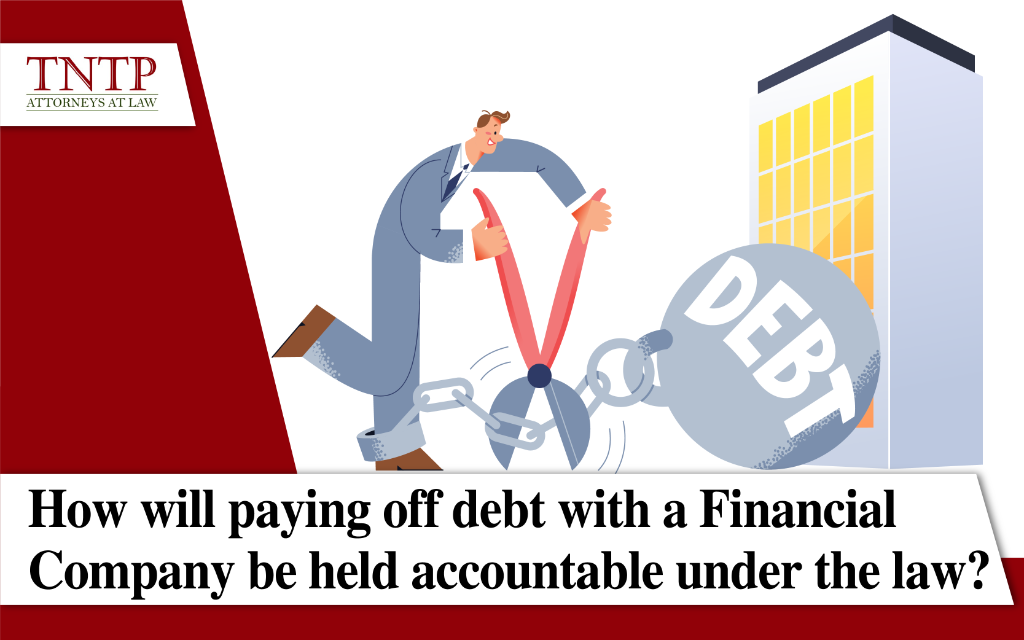How will paying off debt with a financial company be held accountable under the law

Currently, it can be observed that many associations and groups on social media engage in behaviors that lure and guide numerous individuals into indebtedness with financial companies, attracting hundreds to thousands of members. What legal risks and dangers does this behavior entail? In this article, TNTP’s lawyers will provide their perspective on the question: “How will paying off debt with a Financial company be held accountable under the law?”
1. Behavior of getting into debt with financial companies
According to legal regulations, financial companies are non-banking credit institutions, and they function to lend, including installment loans and bank overdrafts. Thus, the lending services of financial companies are legally permitted activities and must be carried out by legal provisions.
Getting into debt with financial companies involves borrowers exploiting the simplified loan application process of these financial companies through online platforms, apps, or by submitting loan applications with simple authentication conditions, such as only requiring a phone number or national identification card. Deceptive acts aimed at misappropriating borrowed funds from financial companies may range from simple actions like providing phone numbers from disposable SIM cards or intentionally providing misleading information to meet the requirements for completing loan applications to sophisticated and complex acts such as forging documents and national identification cards to deceive artificial intelligence-based lending app systems. Many individuals have successfully executed these behaviors, spreading rapidly on social media and even being viewed by some as a quick way to make money, causing significant public concern.
2. Negative Impact on Financial Companies and Social Order
The increasing trend of getting into debt has serious implications for the lending activities of financial companies. Many individuals fail to distinguish between the legitimate lending activities of financial companies and the illicit lending activities of black-market credit organizations, leading to intentional indebtedness. Additionally, the proliferation of consumer loan apps impersonating financial companies has skewed perceptions, causing many people to view legitimate financial companies negatively and impacting the reputation and lawful business operations of the financial system, which, in essence, contributes significantly to societal benefits.
The growing activities of debt-inducing associations pose risks to financial companies as they struggle to recover the lent funds. This directly affects the business growth and revenue of financial companies. In turn, this situation may lead many individuals facing financial difficulties to be unable to access capital from legitimate financial companies, increasing the likelihood of resorting to the services of black-market lenders with exorbitant interest rates. These illicit operations not only contribute to the erosion of social order and safety but also pose a threat to individuals’ financial well-being.
3. Legal Risks in Getting into Debt
a) Criminal Law Violations
In cases of legal violations, as stipulated in the Penal Code, the act of using deceptive behavior to obtain property or creating conditions for debt repayment but failing to repay may constitute the offense of Misappropriation of Property under Article 175 of the 2015 Penal Code. The penalty for this offense ranges from 6 months to 20 years in prison, depending on the amount borrowed.
Therefore, when borrowers lack the means to repay the loan at the time of borrowing but still provide false information to financial companies to receive the loan, it may also constitute the offense of Fraudulent Misappropriation of Property due to the deceptive declarations made.
Moreover, individuals who intentionally evade repayment, provide false information, or forge documents to avoid fulfilling their repayment obligations can be considered as engaging in deceptive behavior to misappropriate property. Additionally, those who establish groups on social media to “share” methods of getting into debt may violate the law and be subject to fines ranging from 10,000,000 to 20,000,000 VND for the offense of Aiding and Abetting under Article 17 of the Penal Code, as they encourage and assist others in committing crimes.
b) Civil Dispute Cases
In situations where borrowers do not engage in deceptive practices to get into debt but are unable to repay due to financial conditions, it does not constitute criminal offenses. However, it may give rise to civil legal disputes for the borrower.
In such cases, financial companies may file lawsuits against borrowers for failing to fulfill their repayment obligations as per the loan agreement, affecting the rights of the lending party. The dispute resolution authority, such as the court, will then proceed with legal procedures to issue a Judgment/Decision compelling the borrower to fulfill their repayment obligations.
After the Judgment/Decision becomes legally effective, the authorized enforcement agency will carry out the enforcement phase, during which coercive measures will be applied to the debtor under legal regulations until the repayment obligations are fully met.
From the above content, it can be seen that engaging in getting into debt can lead to civil disputes or even criminal prosecution. Therefore, individuals need to be aware of legal compliance and adhere to civil transactions to ensure social order and their interests.
The above is an article by TNTP’s lawyers on the topic: ” How will paying off debt with a financial company be held accountable under the law”. Hopefully this article provides value to the readers.
Sincerely,


